The IT University of Copenhagen (ITU) invites highly motivated candidates to apply for a PhD position starting in Summer 2022 or soon thereafter. There are a number of funded positions available and the applicants are encouraged to align themselves with a proposed research project. One of these projects is:
Infrastructuring open data commons: Exploring the temporalities of sustainable IT design and management
What sustainability thinking entails for digitalization and IT design is currently a hot topic. While the term sustainability remains highly contested with regard to its definition and meanings, e.g. whether it relates to economic, social, environmental, cultural or security matters, many would probably agree that time forms one of its central dimensions. The temporal reach of sustainable development was defined already in the so-called Brundtland report (1987) as development that meets the needs of the present without compromising the ability of future generations to meet their own needs. The proposed PhD project is motivated by the current state of IT design fields; both sustainability and temporal matters are under-researched.
In this doctoral project sustainability in IT design and management is addressed via a temporal interest, looking holistically at design and organization of open data services and infrastructures. The research design brings together an empirical field, design approaches and theoretical perspectives that subscribe to different temporal assumptions in order to be able to explore their meeting in practice. The empirical case is Long Term Ecological Research network in Denmark. LTER science aims for sustainability of the Earth by employing a long-term temporal paradigm in research, data management and infrastructure work. The project’s design method(ologie)s of Service Design and Participatory Design are – akin to most IT design approaches – either time agnostic or short-term future-oriented. The chosen theoretical perspectives of infrastructures/infrastructuring and commons/commoning, in turn, recognize extended temporal scopes of design.
This PhD project asks how will sustainability take shape and be shaped in relation to the myriad of temporalities present in the infrastructuring of open data commons for LTER research by employing participatory and service design approaches? What temporalities are at play? How to bring them into alignment for creating sustainable IT design and management?
The key theoretical perspectives relevant to this PhD project are infrastructures and infrastructuring as well as commons and commoning. They provide an analytical frame based on relational and processual ontologies for studying the empirical case, LTER-DK. In addition, the project draws on interdisciplinary studies of time and temporality.
Empirical case: Participatory Design of Open Data Services in LTER-DK
The study finds main focus with the Long Term Ecological Research (LTER) network of Denmark but also reaches to the European LTER network with its ESFRI funded eLTER Research Infrastructure to understand the European research infrastructure policy context that gives framing for national LTER networks’ infrastructuring efforts. This is a fertile empirical ground where the long-term thinking of the LTER science and network meets with the time agnostic or short-term future-oriented methods and procedures of Service Design in order to collaboratively engage in infrastructuring sustainable data commons for LTER-DK.
Successful candidates
The project is looking for a successful candidate to work within the field of Service Design and Participatory Design. Concretely, the Service Design approach is applied to address how to co-design and organize data management and curation of digital services to various key stakeholders, including e.g., data description and submission, and data accessibility.
The successful candidate should have experience in some of the following research areas:
– Service Design and Management
– Participatory Design
– Science and Technology Studies
– Organizational Design and Management
– Research Infrastructures and Policy
– Open Data and Open Research
The ideal candidate should also have:
– Commitment to work collaboratively on an interdisciplinary project
– Theoretical and practical knowledge and experience of qualitative and ethnographic research methods
– Practical knowledge and experience of collaborative/participatory design
All applications are welcome, especially those from members of underrepresented groups are encouraged.
More information can be found:
PhD Open Call 2022
Details of all proposed research projects
—————–
















